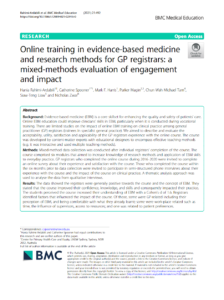 Our paper on the evaluation of an online EBM and research methods training modules that I helped develop was published in BMC Medical Education.
Our paper on the evaluation of an online EBM and research methods training modules that I helped develop was published in BMC Medical Education.
Citation
Rahimi-Ardabili H, Spooner C, Harris MF, Magin P, Tam CWM, Liaw ST, et al. Online training in evidence-based medicine and research methods for GP registrars: a mixed-methods evaluation of engagement and impact. BMC Med Educ. 2021;21(1):492.
Abstract
Background
Evidence-based medicine (EBM) is a core skillset for enhancing the quality and safety of patients’ care. Online EBM education could improve clinicians’ skills in EBM, particularly when it is conducted during vocational training. There are limited studies on the impact of online EBM training on clinical practice among general practitioner (GP) registrars (trainees in specialist general practice). We aimed to describe and evaluate the acceptability, utility, satisfaction and applicability of the GP registrars experience with the online course. The course was developed by content-matter experts with educational designers to encompass effective teaching methods (e.g. it was interactive and used multiple teaching methods).
Methods
Mixed-method data collection was conducted after individual registrars’ completion of the course. The course comprised six modules that aimed to increase knowledge of research methods and application of EBM skills to everyday practice. GP registrars who completed the online course during 2016–2020 were invited to complete an online survey about their experience and satisfaction with the course. Those who completed the course within the six months prior to data collection were invited to participate in semi-structured phone interviews about their experience with the course and the impact of the course on clinical practice. A thematic analysis approach was used to analyse the data from qualitative interviews.
Results
The data showed the registrars were generally positive towards the course and the concept of EBM. They stated that the course improved their confidence, knowledge, and skills and consequently impacted their practice. The students perceived the course increased their understanding of EBM with a Cohen’s d of 1.6. Registrars identified factors that influenced the impact of the course. Of those, some were GP-related including their perception of EBM, and being comfortable with what they already learnt; some were work-place related such as time, the influence of supervisors, access to resources; and one was related to patient preferences.
Conclusions
This study showed that GP registrars who attended the online course reported that it improved their knowledge, confidence, skill and practice of EBM over the period of three months. The study highlights the supervisor’s role on GP registrars’ ability in translating the EBM skills learnt in to practice and suggests exploring the effect of EBM training for supervisors.
